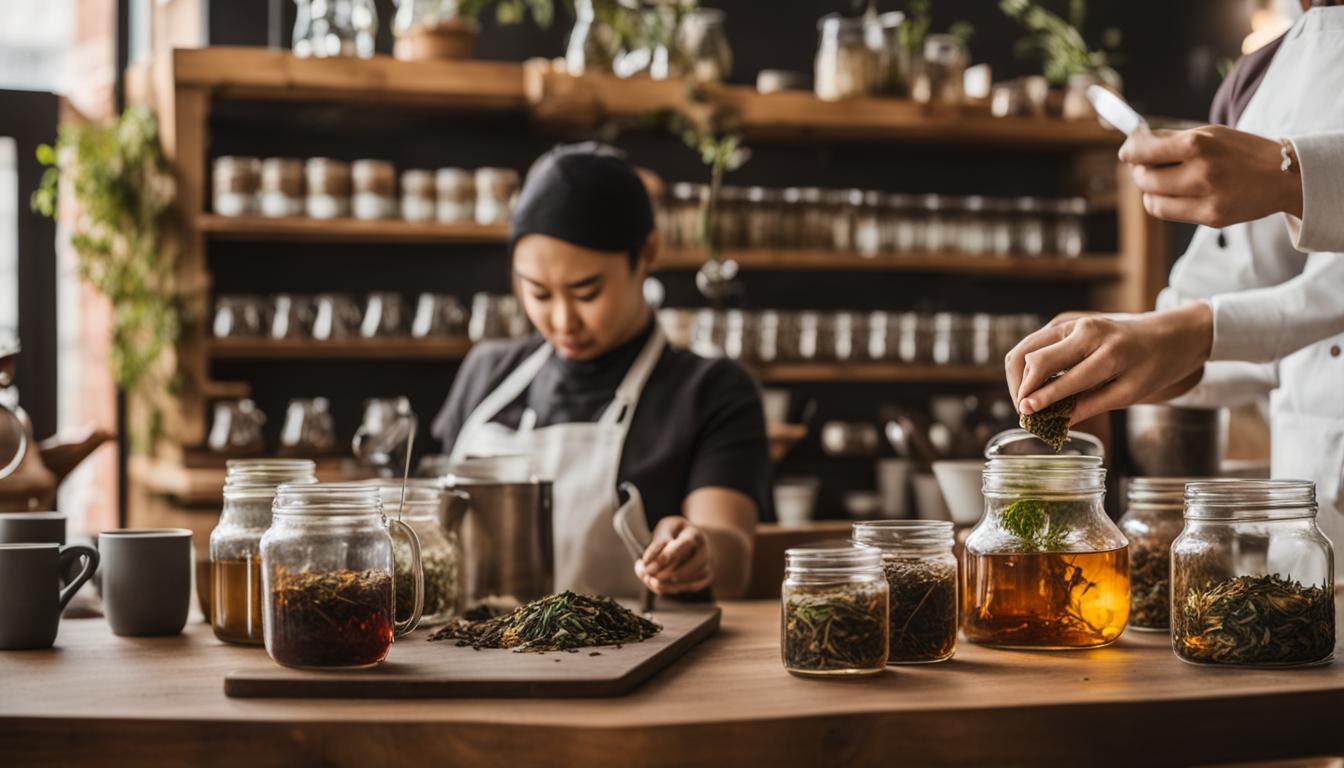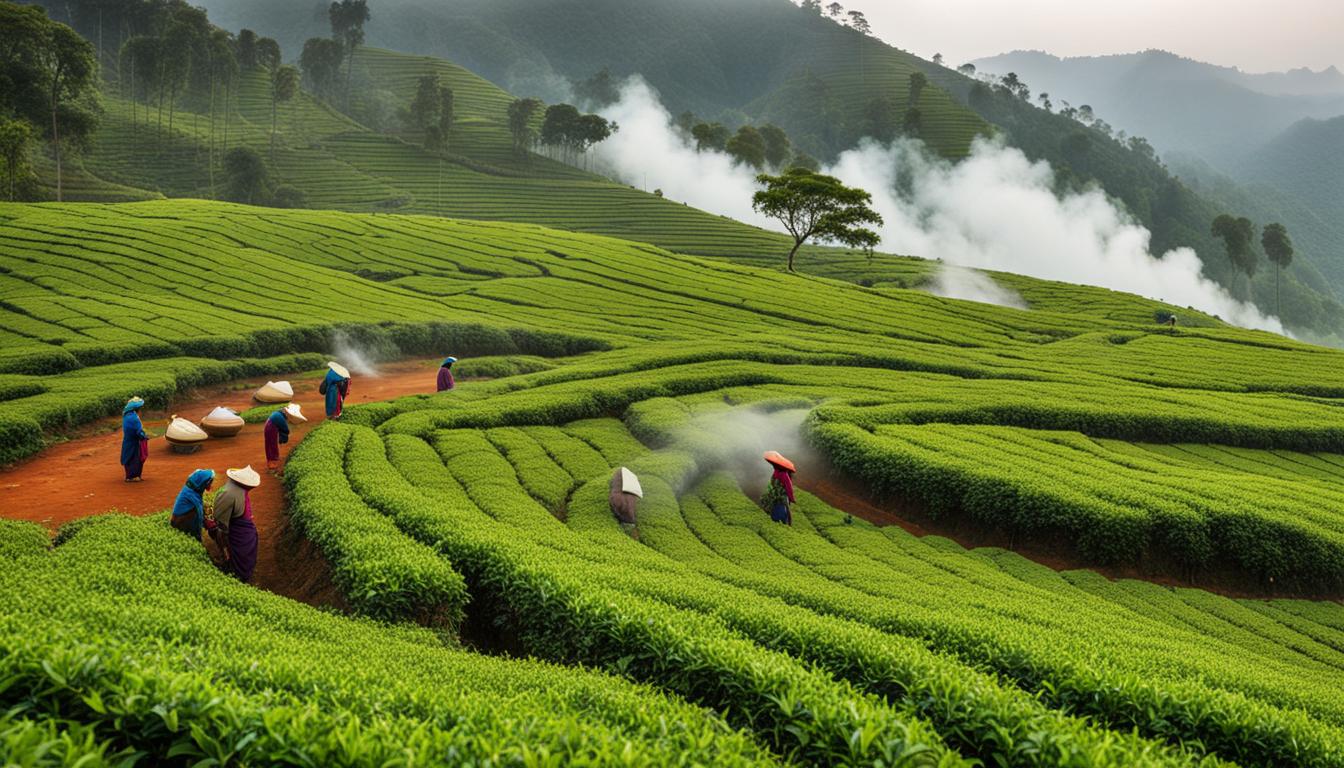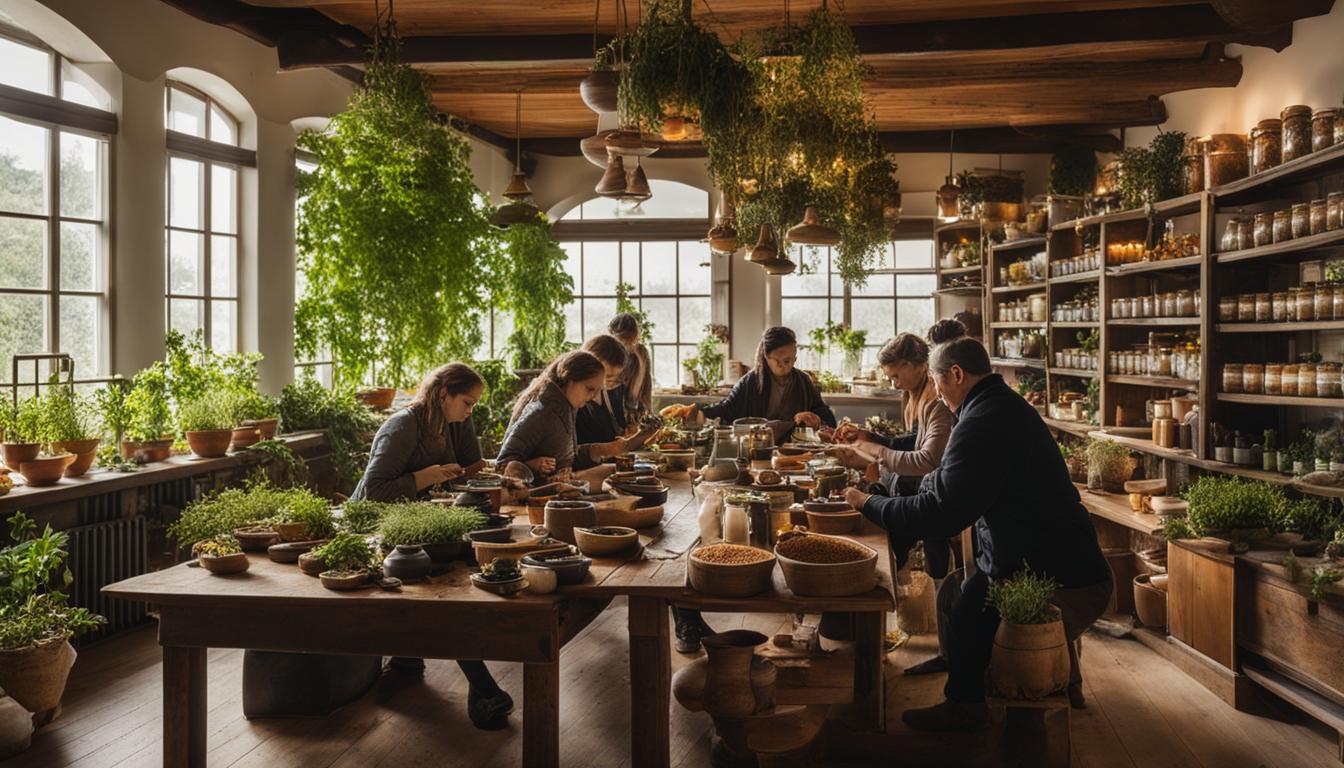Welcome to our blog! Today, we’re diving into the world of tea cafés and their commitment to organic and sustainable practices. These innovative cafés are revolutionizing the industry by prioritizing eco-friendly operations, fair trade sourcing, and ethical tea production. Join us as we explore how these tea cafés are leading the way in creating a more sustainable and ethical tea culture.
Key Takeaways:
- Tea cafés are embracing organic and sustainable practices to minimize their environmental impact.
- They prioritize sourcing sustainable tea from eco-friendly farms and promoting fair trade practices.
- Tea cafés are actively searching for sustainable tea packaging solutions to reduce waste and pollution.
- These cafés offer a wide variety of organic teas and prioritize fair trade teas to support social and economic sustainability.
- Tea cafés are implementing eco-conscious brewing methods to minimize waste and energy consumption.
Sustainable Tea Farming Practices
In our commitment to organic and sustainable practices, tea cafés prioritize environmentally friendly tea farming methods. We understand the importance of minimizing the use of synthetic fertilizers and pesticides to ensure the health and biodiversity of tea farms. By embracing organic tea farming practices, we aim to protect the surrounding ecosystems and contribute to a more sustainable tea industry.
Tea production can have a significant environmental impact, including deforestation, soil degradation, water pollution, and greenhouse gas emissions. To address these issues, we take responsibility for the environmental impact of tea production. We focus on responsible water usage and waste management throughout the farming process, seeking to minimize our carbon footprint and preserve the natural resources that sustain us.
By promoting sustainable tea farming practices, we strive to create a better future for tea cultivation. We understand that every decision we make on the farm has a ripple effect on the environment and local communities. That’s why we are committed to making choices that prioritize the health of our planet and support the long-term viability of tea farming.
“We believe that sustainable farming is not just about producing high-quality tea, but also about fostering a harmonious relationship with nature. By embracing organic practices, we can preserve the natural richness of tea-growing regions and promote a more sustainable tea industry for generations to come.” – Tea Café Owner
The Benefits of Organic Tea Farming
Organic tea farming offers numerous benefits, both for the environment and for the quality of the tea itself. By avoiding the use of synthetic chemicals, organic tea farms promote biodiversity, protect soil health, and reduce water pollution. This, in turn, results in teas that are free from harmful residues and have a purer, more authentic flavor.
| BENEFITS OF ORGANIC TEA FARMING |
|---|
| Promotes biodiversity |
| Protects soil health |
| Reduces water pollution |
| Produces teas free from harmful residues |
| Enhances flavor and quality |
Green Tea Café Certifications
Green tea café certifications are an integral part of ensuring that cafés adhere to specific sustainability standards. These certifications evaluate various factors, including sourcing practices, waste management, energy usage, and social responsibility. By obtaining these certifications, cafés demonstrate their commitment to implementing eco-friendly practices and can use them as a powerful marketing strategy to attract environmentally conscious consumers.
One noteworthy green tea café certification is the Eco-Tea Certification, which sets strict guidelines for sustainable tea sourcing and promotes ethical business practices. Cafés with this certification must source their tea from organic farms that prioritize biodiversity preservation and minimize the use of synthetic chemicals. Additionally, they must implement responsible waste management and energy-efficient operations to reduce their environmental impact.
“Our café is proud to be certified by the Eco-Tea Certification. It’s a testament to our dedication to sustainability and providing our customers with the highest quality organic teas. Being certified has not only boosted our credibility but also allowed us to connect with like-minded individuals who appreciate our commitment to the environment.” – Jane Miller, Owner of GreenLeaf Tea Café
Eco-Tea Certification Criteria:
- Tea sourcing from organic farms that prioritize biodiversity preservation
- Minimization of synthetic chemicals in tea production
- Responsible waste management practices
- Implementation of energy-efficient operations
- Promotion of fair trade practices
Another significant certification in the industry is the Sustainable Tea Café Certification. This certification focuses not only on environmental sustainability but also on social and economic factors. Cafés with this certification must demonstrate their commitment to fair trade practices, ensuring that tea farmers receive fair wages for their labor and promoting sustainable livelihoods in tea-producing regions. Furthermore, they must actively engage in community initiatives that contribute to the welfare of tea-growing communities.
By obtaining these certifications, green tea cafés are making a positive impact on the environment and society. They are setting an example for the industry by showcasing their dedication to sustainable practices and providing consumers with an opportunity to support businesses that align with their values.
Sustainable Tea Packaging Solutions
As part of our commitment to promoting sustainability in tea cafés, we are actively searching for innovative and eco-friendly tea packaging solutions. We understand the importance of reducing our environmental footprint and minimizing waste in the industry. By choosing sustainable packaging materials, we can make a significant impact on the health of our planet.
The Benefits of Sustainable Packaging
Switching to sustainable tea packaging offers numerous benefits. Firstly, it helps to reduce the amount of plastic waste generated in the industry. Many traditional tea packaging options contain non-recyclable materials that contribute to landfill pollution. By opting for biodegradable, compostable, or recyclable packaging materials, we can minimize our carbon footprint and protect the environment.
Secondly, sustainable packaging is often made from renewable resources, such as plant-based materials or recycled paper. By utilizing these materials, we can decrease our reliance on fossil fuels and promote a more circular economy. This not only conserves valuable resources but also reduces the overall energy consumption associated with manufacturing and transporting packaging materials.
Our Sustainable Tea Packaging Solutions
At our tea café, we are proud to offer a range of sustainable tea packaging solutions. Our teas are packaged in biodegradable tea bags made from natural fibers, ensuring that they break down easily and do not contribute to plastic pollution. Additionally, we provide loose-leaf tea options that are packaged in reusable and recyclable tins, reducing the need for single-use packaging.
| Packaging Type | Material | Environmental Impact |
|---|---|---|
| Biodegradable Tea Bags | Natural fibers (e.g., corn silk, hemp) | Break down easily, reducing plastic pollution |
| Reusable Tea Tins | Recyclable metal or glass | Minimize waste and promote reuse |
| Compostable Tea Pouches | Plant-based materials (e.g., cornstarch) | Degrade in composting facilities, reducing landfill waste |
By offering these sustainable packaging options, we aim to provide our customers with a guilt-free tea drinking experience. We believe that every small change can make a big difference when it comes to protecting our planet. Join us in our mission to embrace sustainable tea packaging solutions and create a brighter future for the tea industry.
Organic Tea Product Lines
At our tea café, we take pride in offering a diverse selection of organic tea product lines. We believe that organic teas not only taste better but also contribute to a healthier environment and support sustainable farming practices. Our commitment to organic tea extends to our partnerships with tea farmers who prioritize organic farming methods and do not use synthetic chemicals or pesticides. By sourcing our teas from these farms, we ensure that our customers can enjoy the purest and most natural flavors in every cup.
One of the key advantages of organic tea product lines is their positive impact on the environment. Organic farming methods promote soil health and biodiversity, preserving the delicate ecosystems surrounding tea farms. By avoiding the use of synthetic fertilizers and pesticides, organic tea production helps reduce soil erosion, water pollution, and overall environmental degradation. As a result, choosing organic teas supports a more sustainable and regenerative approach to tea production.
Fair trade practices are also a priority for us when it comes to our tea product lines. We strive to source fair trade teas that ensure tea farmers receive fair wages and have safe working conditions. By supporting fair trade, we contribute to the social and economic sustainability of tea-producing regions, empowering farmers and their communities. When you choose our organic and fair trade teas, you are not only indulging in a delightful beverage but also making a positive impact on the lives of tea farmers.
The Benefits of Organic Tea Product Lines:
- Pure and natural flavors
- Reduced environmental impact
- Preserved biodiversity
- Support for fair trade practices
- Empowerment of tea farmers and their communities
Experience the difference of our organic tea product lines and join us in supporting sustainable farming practices and fair trade in the tea industry. Explore our wide range of organic teas and discover the unique flavors and benefits they have to offer.
| Tea Type | Description | Flavor Profile |
|---|---|---|
| Green Tea | Made from unoxidized leaves, green tea is known for its fresh and vegetal taste. | Grassy, floral, or nutty |
| Black Tea | Fully oxidized tea leaves create a robust and bold flavor. | Malty, fruity, or smoky |
| Oolong Tea | Semi-oxidized tea with a wide range of flavors, from light and floral to dark and rich. | Floral, fruity, or toasty |
| Herbal Tea | Herbal infusions made from various herbs and botanicals, offering a wide range of flavors and benefits. | Earthy, fruity, or minty |
Choose organic. Choose fair trade. Choose a delicious and sustainable cup of tea.
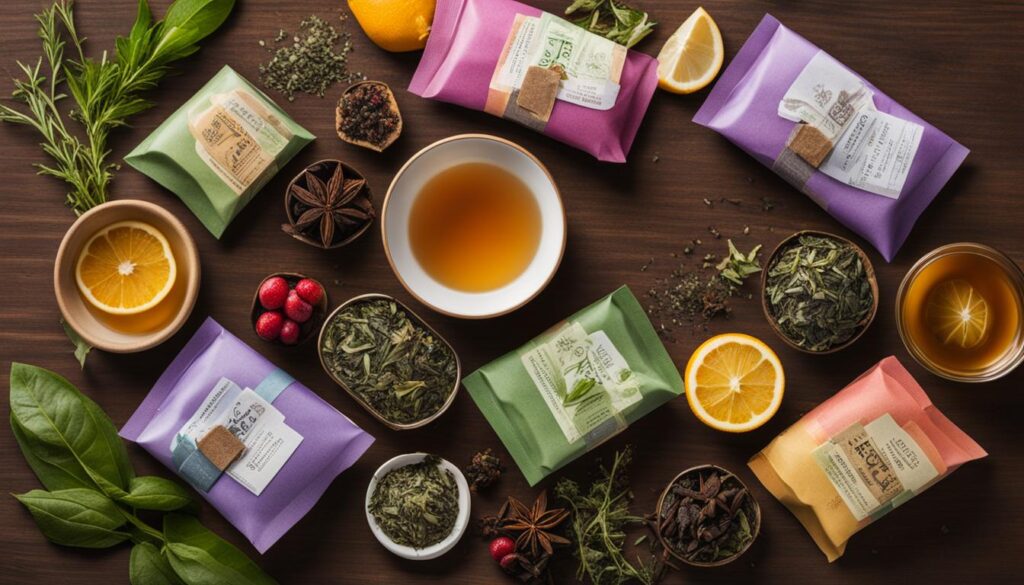
Environmental Impact of Tea Production
The production of tea can have significant environmental impacts, ranging from deforestation to water pollution. At our tea cafés, we are keenly aware of these issues and are taking proactive steps to minimize our environmental footprint. We believe that sustainability should be at the core of every aspect of the tea industry, and we are committed to leading the way in eco-friendly practices.
One of the key ways we address the environmental impact of tea production is by sourcing our tea from sustainable farms that prioritize organic farming methods. By avoiding the use of synthetic fertilizers and pesticides, these farms help preserve biodiversity and protect the surrounding ecosystems. We also work closely with our farmers to ensure responsible water usage and waste management throughout the farming process.
But our commitment to sustainability doesn’t end at the farm level. In our tea cafés, we adopt energy-efficient operations and explore innovative solutions to mitigate the carbon footprint associated with tea production. We believe that every small step counts, whether it’s reducing water usage, implementing energy-saving technologies, or promoting recycling and composting. By making these conscious choices, we strive to create a more sustainable and environmentally friendly tea culture.
The Importance of Consumer Awareness
Of course, we cannot achieve our sustainability goals without the support and awareness of our customers. We believe in the power of education and transparency, which is why we actively engage with our customers to raise awareness about the environmental impact of tea production. Through informative table displays, engaging workshops, and educational materials, we provide our customers with the knowledge and tools to make environmentally conscious choices.
| Deforestation | Soil Degradation | Water Pollution | Greenhouse Gas Emissions | |
|---|---|---|---|---|
| Environmental Impact | Clearing of forests for tea plantations leads to habitat loss and reduces carbon sequestration. | Intensive cultivation methods and improper soil management can lead to soil erosion and degradation. | Excessive use of pesticides and chemical fertilizers can contaminate water sources. | Tea production contributes to greenhouse gas emissions through energy consumption and land-use changes. |
| Our Approach | We source tea from sustainable farms that prioritize reforestation and conserving natural habitats. | We work with farmers to implement soil conservation practices and promote organic farming methods. | We prioritize responsible water usage and waste management in our cafés. | We actively explore energy-efficient technologies and offset our carbon emissions through renewable energy initiatives. |
Join Us in Making a Difference
We invite you to join us on this journey towards a more sustainable tea industry. By choosing to support tea cafés that prioritize eco-friendly practices, you are making a positive impact on the environment. Together, we can create a more sustainable future for tea production and consumption.
Eco-Conscious Tea Brewing Methods
At our tea café, we are committed to implementing eco-conscious tea brewing methods that not only provide a delightful tea experience but also help protect the environment. We understand the importance of minimizing waste and energy consumption throughout the brewing process, and we have taken several steps to promote sustainable practices among our staff and customers.
Promoting Loose-Leaf Tea
One of the key ways we reduce waste is by promoting the use of loose-leaf tea instead of tea bags. Many tea bags contain plastic, which can take hundreds of years to decompose. By offering loose-leaf teas, our customers can enjoy the full flavor and aroma of the tea while reducing unnecessary waste. We provide a variety of loose-leaf options, allowing our customers to customize their brews and discover new and exciting flavors.
Encouraging Reusable Cups
Another important aspect of our eco-conscious brewing methods is encouraging customers to bring their own reusable cups. We offer discounts to customers who bring their own cups, incentivizing them to make sustainable choices while enjoying their favorite teas. By reducing the use of single-use cups, we can significantly minimize the amount of waste generated in our café and contribute to a greener future.
Energy-Efficient Brewing Equipment
Our commitment to eco-conscious brewing extends to the equipment we use. We have invested in energy-efficient brewing equipment that helps minimize our energy consumption without compromising the quality of our teas. By using equipment that is designed with sustainability in mind, we are able to reduce our carbon footprint and operate in a more environmentally friendly manner.
Apart from these initiatives, we also prioritize recycling and waste management within our café. We have designated recycling bins for paper products, plastic, and glass, ensuring that these materials are properly disposed of and given a chance to be repurposed. Our staff is trained to follow sustainable practices, such as conserving water and energy, further contributing to our eco-conscious efforts.
“Our eco-conscious tea brewing methods not only provide a delightful tea experience but also help protect the environment.”
By implementing these eco-conscious tea brewing methods, we aim to inspire our customers and the broader tea community to adopt more sustainable practices. We believe that every small action can make a difference, and together, we can create a more sustainable and eco-friendly tea culture for future generations to enjoy.
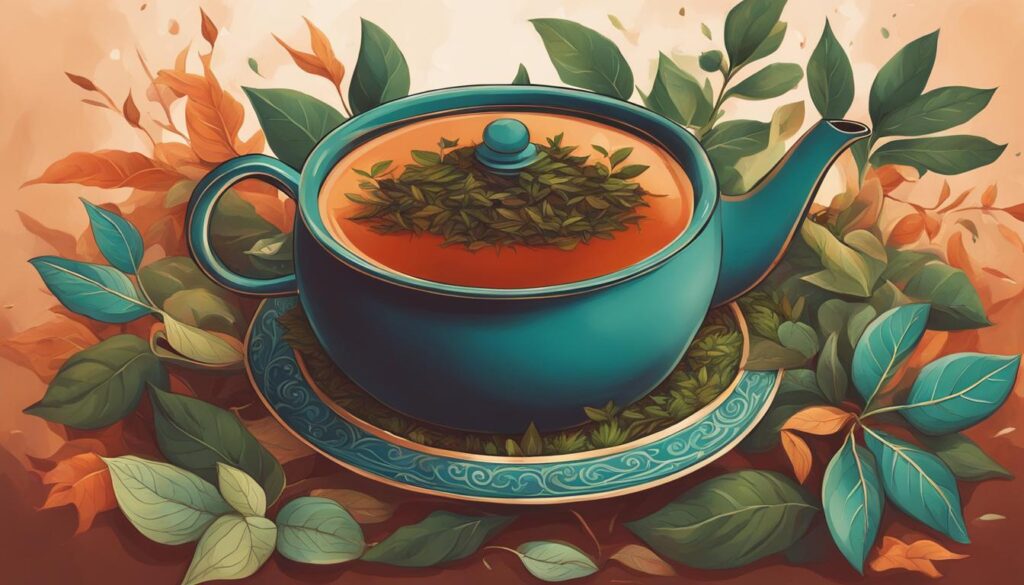
Conclusion
As we wrap up our exploration of organic practices in tea cafés, it’s clear that these establishments are at the forefront of eco-friendly operations and sustainable tea marketing strategies. By prioritizing organic and sustainable practices, tea cafés are making a positive impact on the environment and promoting ethical tea sourcing.
From the sustainable tea farming practices to the implementation of green tea café certifications, these establishments are dedicated to minimizing their environmental footprint. By choosing biodegradable, compostable, or recyclable packaging materials, they are actively reducing plastic waste in the industry.
Furthermore, tea cafés are proud to offer customers a wide range of organic tea product lines, sourced from environmentally conscious tea farmers. By supporting fair trade practices, these cafés are not only providing customers with delicious teas but also ensuring that tea farmers receive fair wages for their hard work.
In conclusion, eco-friendly tea café operations and sustainable tea marketing strategies are fundamental to the success and growth of the industry. By embracing organic and sustainable practices, tea cafés are not only serving exceptional teas, but also fostering a more sustainable and ethical tea culture. Join us as we continue to support these initiatives and make a positive impact on our planet, one cup of tea at a time.
FAQ
What are tea cafés doing to embrace organic and sustainable practices?
Tea cafés are committed to sourcing sustainable tea from eco-friendly farms and minimizing their environmental impact through green operations. They also focus on implementing sustainable tea packaging solutions and offering organic tea product lines.
What sustainable tea farming practices do tea cafés prioritize?
Tea cafés prioritize organic farming methods that minimize the use of synthetic fertilizers and pesticides. They aim to preserve biodiversity, protect ecosystems, and consider responsible water usage and waste management throughout the tea farming process.
Are there any certifications for green tea cafés?
Yes, green tea café certifications evaluate factors such as sourcing practices, waste management, energy usage, and social responsibility. These certifications recognize cafés for their commitment to eco-friendly practices and can be used as a marketing strategy.
How do tea cafés approach sustainable tea packaging?
Tea cafés opt for biodegradable, compostable, or recyclable packaging materials to minimize waste and pollution. By choosing sustainable packaging, they contribute to reducing the amount of plastic waste generated in the industry.
What is the significance of organic tea product lines in tea cafés?
Tea cafés offer a wide variety of organic teas sourced from farms that do not use synthetic chemicals or pesticides. They also prioritize fair trade teas, ensuring tea farmers receive fair wages and promoting social and economic sustainability in tea-producing regions.
What is the environmental impact of tea production?
Tea production can lead to deforestation, soil degradation, water pollution, and greenhouse gas emissions. Tea cafés aim to reduce their environmental impact through sustainable farming practices, minimizing water usage, and adopting energy-efficient operations.
What eco-conscious tea brewing methods do tea cafés adopt?
Tea cafés prioritize using loose-leaf tea instead of tea bags, as tea bags often contain plastic and are not biodegradable. They also encourage customers to bring their own reusable cups and offer discounts for doing so, promoting conscious brewing practices.
How are tea cafés contributing to a more sustainable and ethical tea culture?
Tea cafés embrace organic and sustainable practices, reducing their environmental impact, minimizing waste, and supporting fair trade practices. By doing so, they not only provide customers with delicious brews but also contribute to a more sustainable and ethical tea culture.
Source Links
- https://www.vailcoffee.com/pages/sustainability-community-altitude
- https://www.indianretailer.com/article/retail-business/sustainability/sustainability-trends-how-tea-and-coffee-industries-are
- https://www.indianretailer.com/article/retail-business/sustainability/sustainability-trends-how-tea-and-coffee-industries-are?page=10

